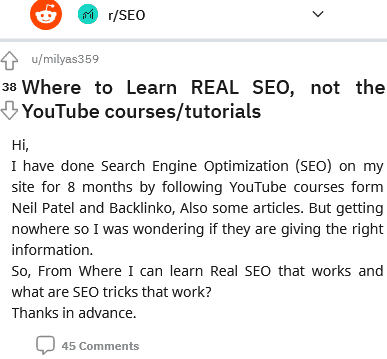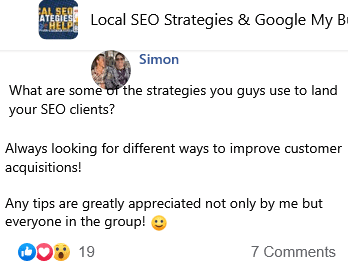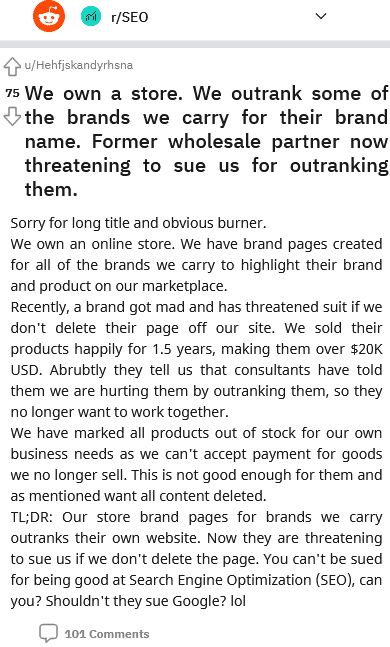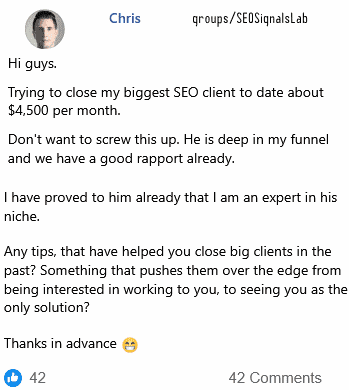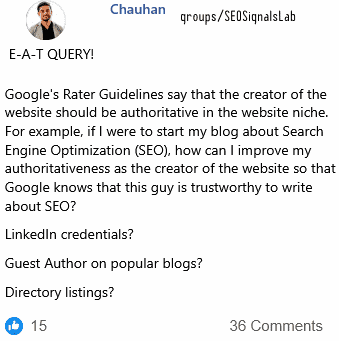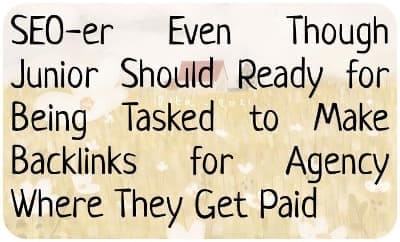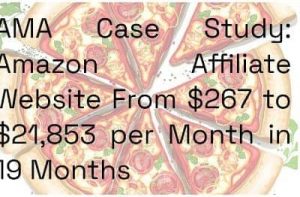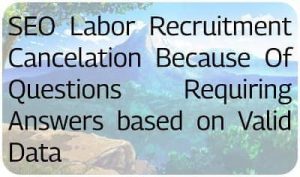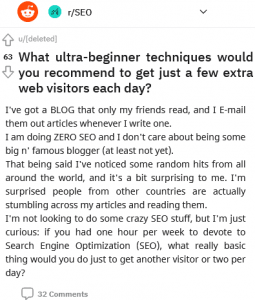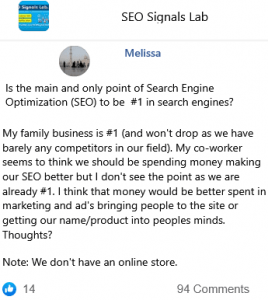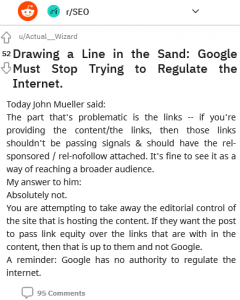Where to Learn REAL SEO, not the YouTube courses/tutorials
Hi,
I have done Search Engine Optimization (SEO) on my site for 8 months by following YouTube courses form Neil Patel and Backlinko, Also some articles. But getting nowhere so I was wondering if they are giving the right information.
So, From Where I can learn Real SEO that works and what are SEO tricks that work?
Thanks in advance.
45 💬🗨
📰👈
Well my friend you are learning real SEO!
One of the first rules as that you should never take what anyone says at face value because what works for one site/niche isn't guaranteed to work for another.
Another important rule is that what these larger websites do for their SEO isn't always relevant for smaller sites starting out. Yes, Brian Dean can earn a thousand backlinks when he publishes a 10,000 word guide on how to build top tier content to earn links. That's because he's famous within the SEO field. People knowing. people link to him because they believe what he says is true. That play doesn't work so well if you're just a smaller affiliate website trying to earn a buck or two off of Amazon.
There's some hard fast rules IMO that apply to damn near anyone and damn near any site:
It really is important to create quality content. How quality? That depends on the competition. If you're entering a very low competition niche, don't waste a whole lot of time creating content. Get what you need up and then move on to better things until you can gauge how Google is going to respond to that content.
it really is important to create backlinks. Not shitty, easy to get backlinks, but quality back links from sites to have some decent traffic. IMO, traffic is one of the best indicators of overall site quality. If a website's generating organic traffic, there's a really good chance that it's in good favor with Google. In other words, it's a link that's going to provide your site with SEO value.
it's also really imperative to do keyword research ahead of time. This should be done for articles, but should also be done for an entire niche and/or website and/or competitors before you start launching a new SEO campaign. You need to know, or at least have a ballpark estimate, of how easily it will be to rank content in a certain niche. If you're going after something That 15 other Fortune 500 companies are going after then it's not likely that you'll ever be able to rank well in that niche and no amount of content and backlinks, at least at a single person can create, is likely to affect that.
That's really it. There's a million other things that you can get into but if you do those three things well you're going to be set up for success.
One of the first rules as that you should never take what anyone says at face value because what works for one isn't guaranteed to work for another.
Don't forget that big chunk of SEO tools is snake oil. The whole industry is build around the idea of making SEO look complicated and intimidating, while for 99% websites (small businesses for example) you can do with common sense.
But otherwise you are right in your points.
I'd agree for local SEO, but I think even for small business SEO there can be some very polarizing differences between niches. For example, it'd be a lot easier to rank a post on a plumber's blog than it would be a doctors blog given the Your Money or Your Life (YMYL) considerations made by Google.
I think what you said is true in the majority of cases, but fails just enough that if we're talking about general rules here, you always need to be on guard.
soldadodecope
Why is it harder for doctors?
theeastcoastwest
Websites related to topics such as money, finance, etc are regarded differently by Google based on the assumption that the information there in can influence decisions that would have great effect over a person's life.
Google calls these types of content y m y l which stands for:
Your money or your life.
That's straight out of the official search guidelines document by Google.
So the takeaway here is that Google might be indiscriminate in terms of showing locations of doctors on a map for a local search, but it's likely that they would be very discriminate about showing results from those businesses websites blogs and regular organic keyword searches such that each website would need to establish authority. That brings us to another acronym that Google likes:
EAT: expertise, authoritativeness, and trustworthiness.
So to further jumble this comment with acronyms:
In order to rank in a YMYL niche one must first establish EAT. There's any number of ways to do that but the general idea is that you want, Google especially, to recognize the author of said content as being an authority on the subject such that their opinion and ideas could be trusted by people in such a way that generally leads to positive outcomes.
In other words, for someone searching a term like "natural cures for cancer", Google wants to make sure that the top results are from health professionals and not some random ass affiliate website trying to earn a commission off of vitamin d supplements.
annoyinglyanonymous
As someone building a site in this domain, are there sources that talk more about this?
theeastcoastwest
The search guidelines outlines it pretty well, but doesn't necessarily give you a lot of specifics to go on. I'd say Google around a bit but some general guidelines are as follows:
Make sure authorship is easily identified.
Make sure editorial policies are well outlined and easily found
Make sure authors have their profiles such as Twitter, Facebook, and industry directory profiles linked to from their author page on site.
The tough pill for a lot of people to swallow is that in some cases you can't establish EAT, at least not like a another person with a professional licensure or some acronyms next to their name can. In other words, if you want to start a health blog and have it compete with top health blogs you better either be a licensed health professional or have licensed health professionals posting content on your blog.
With that last bit in mind, I think it's also important to recognize that Google is not all seeing and not all knowing even though they might have us believe so. If you are a non-licensed individual writing about health related topics, IMO you can still somewhat establish yourself as an EAT authority. It's an uphill battle, but still doable. The main path to establish an authority is having your content, explicitly attributed to you as an author, found in other trusted sources for health information. In other words, becoming a contributor on several other large health editorial websites such that your authorship can be linked back to your personal website which can be linked back to your personal website author page and related social media profiles.
You're still never going to get that extra bump that a licensed professional is going to have with acronyms in their name, the presence on professional directories, etc. But it's still doable IMO. Just be prepared for an uphill battle and know that long tail keywords are going to be your game plan probably rather than the top level stuff.
annoyinglyanonymous
Hey, I really appreciate this. I am actually a licensed PhD in my field, and while I use the Dr. title in my authorship, it occurs to me that I should perhaps make a brief bio in my posts that is a little more specific and out links to places that verify that.
Thank you again!
theeastcoastwest
Then you're set up for success my friend. I think that there's currently a huge opportunity for professionals that are looking to really establish themselves as authorities. There's a lot of opportunities out there where large sites like healthline, US news, WebMD, and ETC just through money at things the last two or three years and have created a lot of shitty content that's attributable to really EAT authors. They've absolutely dominated health-related keywords for the past two to three years, but there's a lot of room for higher quality content to come in and outrank them IMO, provided an author can establish authority enough to be a competitor in terms of quality and user reception.
hahkaymahtay
This is so true. People often ask me if SEO is hard and I always say no. Does it have some confusing things and take hard work? Definitely. But it is by no means rocket science.
catlikethief_118
I appreciate Brian Dean, but his success is all about articles and not applicable to e-commerce very often as the Search Engine Result Page (SERP) is different for buying terms than Informational terms.
Agree, 100%. I think that is concepts are pretty applicable across the board but he definitely writes with examples catered to blogs / content heavy websites.
📰👈
SEO Courses and How-tos All Over the Web Seem Very Dubious and Unfounded. Are There Any Good Evidence-Backed SEO Courses?
Any Online Courses Have Leaked the SEO Secrets (SEO Sauce), Beginners Who Paid Them Have Known the Secret Easily
Why Do People Take SEO Online Courses Taught by Those Who Cannot Rank Well With Their Blogs|Websites?
Guide To Build Backlinks Like a True White Hat SEO
You Hired a Backlink VA, and you hoped they would Work With OutReach Method, but They Went with Spammy Methods. How Much Had You paid Them?
